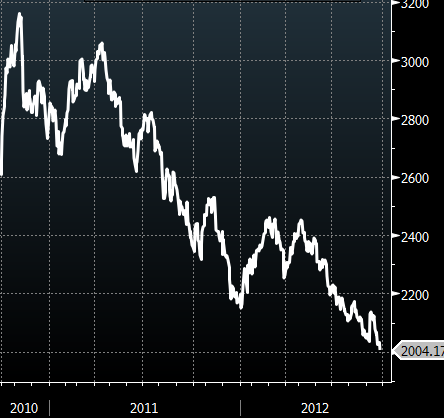by Sober Look
The latest Foxconn incident (see video below) is raising more questions about China's manufacturing sector's ability to grow. It is becoming difficult to see how China's overall economy can expand at projected rates with such uncertainties around manufacturing.
WSJ: - The riot raises questions about the sustainability of China's vaunted manufacturing machine. And it poses a challenge to the government that is struggling to satisfy the soaring expectations of a new generation of Chinese workers who came of age in an era of double-digit economic growth and are less willing than their parents to make personal sacrifices for their country...
We are now seeing clear signs of strain faced by China's high tech factories as they attempt to squeeze more production out of their thin margins (discussed here) - and hitting bottlenecks in the process
FT: - [Foxconn] is the sole assembler for the iPhone 5 this year, with 80-85 per cent of shipments next year as well, according to analysts at Barclays. At an estimated $8 a phone, that workload brings in revenue, but has also put the company under strain. To handle Apple’s demands, Citi analysts estimate, Hon Hai must increase headcount at its Zhengzhou iPhone factory from 150,000 workers in June to 250,000 in October.
The relentless selloff in China's domestic stock market is reflecting this uncertainty in manufacturing growth (as well as the renewed volatility in Europe). The Shanghai Composite Index hit a new multi-year low this morning.
The Shanghai Stock Exchange Composite Index (Bloomberg)
China's official news has little on the incident in Taiyuan, but the authorities are clearly preparing the population for weaker growth ahead. As discussed about a year ago (see post), the impending slowdown will increase risks of social unrest and possibly additional production disruptions. That in turn will hurt confidence and investment, as the economy will become increasingly dependent on government stimulus.
China Daily: - China's economic growth is likely to slow for its ninth consecutive quarter in the period from July to September, top policy advisers said on Tuesday.
If their predictions prove true, the government may find itself taking "remarkable measures" to combat the slump, they said.
Zheng Xinli, deputy head of the China Center for International Economic Exchanges, a government think tank, said China’s economic data for August has turned out worse than expected and the economy’s prospects remain gloomy. Amid those circumstances,the country’s GDP is unlikely to grow at a faster pace in the fourth quarter.
"The urgent need right now is to clarify what are the most effective ways to boost domestic demand," Zheng said.
Source: Reuters
Copyright © Sober Look











